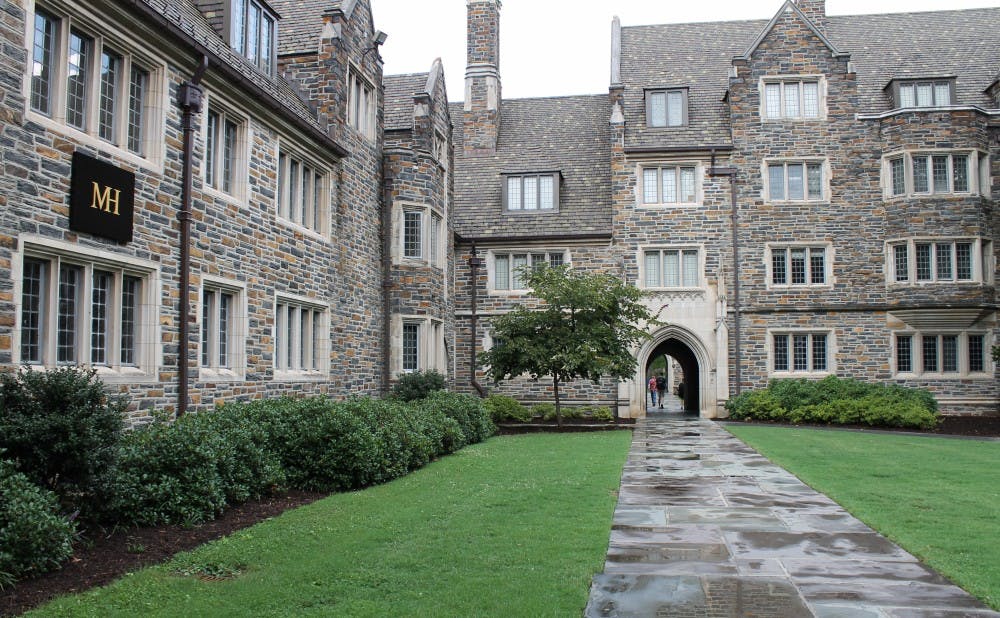The Durham Interfraternity Council—the governing body for nine fraternities that recently disaffiliated from the University— expressed support on Monday for Duke’s “stay-in-place” order and announced a new hotline and judicial board to address fraternity violations of Duke’s COVID-19 guidelines.
University administrators said in a Mar. 10 email that fraternity recruitment events largely drove a recent spike in COVID-19 cases. An emergency policy to deal with the spike implemented Saturday requires undergraduates to remain in their dorms for a week except for essential activities.
In a statement shared with The Chronicle on Monday by Durham IFC President Will Santee, the organization said it “is disappointed that some individuals within fraternities violated the expectations we established for virtual recruitment which may have contributed to an increase in cases of COVID-19 within the Duke student population.”
“We support Duke’s implementation of a shelter-in-place policy in order to curtail further spread of COVID-19 and will use our newly established judicial board to hold accountable anyone who violates the Duke Compact,” it read.
The statement said students and others will be able to contact the organization about “any infractions of the Duke Compact or Durham laws by students suspected to be in the Durham IFC,” and that Durham IFC will then report those violations to Duke.
The statement said Durham IFC has had a “productive conversation” about its plan with Dean of Students John Blackshear and Christopher Rossi, assistant vice president of student affairs. It added that Durham IFC will have “frequent communication” with the Office of Student Affairs.
“We plan to use our platform to raise money for charitable organizations and COVID relief and coordinate with student groups to better address concerns about Greek Life, including but not limited to sexual assault and racial exclusion,” the statement added.
Hotline and judicial board
Santee, a junior, explained in an interview that the hotline is an email he manages, durhamifc@gmail.com. He said he will contact Duke student conduct officials, contact tracers and fraternity presidents if he is made aware that any member of a Durham IFC fraternity has violated the coronavirus protocol.
Santee said that in situations where such reporting is “not sufficient restriction for a certain chapter or individual,” the Durham IFC judicial board will be called upon. The board, which is composed of one volunteer member from each Durham IFC fraternity, could impose punishments like fines or fraternity-wide quarantines.
Asked if chapters could be removed from the Durham IFC should they not comply with board punishments, Santee said non-compliance won’t happen.
“There’s no chance of a chapter being ended because there’s not going to be cases. We’re confident in the Durham IFC, we’re confident in the members to not go out and do stupid things,” he said.
Santee doesn’t expect the hotline to receive emails either. “We're expecting not a single person to use this hotline because we expect that every chapter is just going to stay inside and do what they're supposed to do,” he said.
The confidence in future compliance comes from relationships with the elected fraternity presidents, Santee said.
Asked why he has faith that fraternities will follow rules after administrators alleged their members broke those rules, Santee said “everyone has woken up” since fraternity leaders have met with administrators.
“Everyone knows this is a time to hunker down, wait these couple weeks out, and then make it to the end of the semester and be done with it,” he said.
Santee confirmed that the Durham IFC did not have any independent accountability mechanisms before fraternities faced criticism for spreading the coronavirus through the Duke and Durham communities via parties.
Asked whether the Durham IFC has punished fraternities or fraternity members said to have hosted and attended parties, Santee replied that the board is “newly established” and Durham IFC will entrust Duke to investigate and discipline students who broke the rules in recent weeks.
“We’re really trying to focus on the future,” he said.
Who was responsible?
Get The Chronicle straight to your inbox
Sign up for our weekly newsletter. Cancel at any time.
The Durham IFC’s statement pinned violations on “some individuals within fraternities,” who broke rules requiring virtual rush processes.
Duke administrators wrote in their Saturday announcement of the stay-in-place order that more than 180 students were in isolation after testing positive for COVID-19 in the last week. That surge in cases was largely due to recruitment parties for selective living groups, they wrote.
A March 10 email to students from administrators noted that the majority of the undergraduates who had tested positive for the coronavirus in the prior five days either had “a known Greek affiliation and/or are first-year male students in the class of 2024.”
That email condemned in-person rush events held by people connected to Durham IFC. The administrators wrote that students should not host, attend or participate in any on or off-campus in-person rush events.
Michael Schoenfeld, vice president for public affairs and government relations, said in a Mar. 14 statement that the new coronavirus cases are “almost all linked to unsanctioned fraternity recruitment events that took place off campus. Those who are found responsible for organizing and hosting these events will be held accountable through the student conduct process.”
The fraternity events where the coronavirus spread varied in size and COVID-19 transmission is hard to pin down, Santee said.
“The individuals got COVID, people who happen to be in the Durham IFC got COVID," he said. "...Sometimes when someone just fist bumps someone, that could get COVID."
Santee said confidentiality protections prevent him from knowing which fraternities COVID-19 has most affected. He also said he does not know how large the in-person events held during rush were.
Santee said he knows that the Durham IFC has far reach.
“It affects people who are in fraternities. It affects people who aren’t in fraternities. It affects girls. It affects people who are in SLGs. It affects Duke administration. It affects the Durham community,” he said. He added that he hopes people with comments, questions or criticism will share them with him through the hotline.
Editor's note: This story was updated to clarify that Santee did not refer to the spread of COVID-19 as coincidental.

Chris Kuo is a Trinity senior and a staff reporter for The Chronicle's 118th volume. He was previously enterprise editor for Volume 117.

